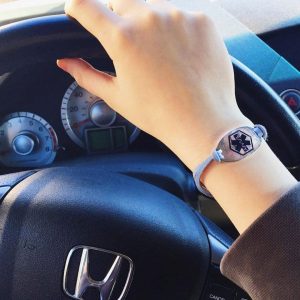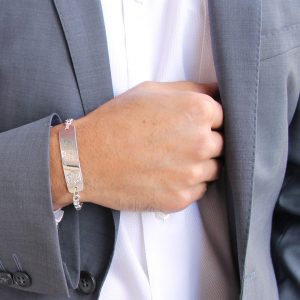A medical ID – an engraved metal bracelet or necklace – contains vital information on the wearers medical condition, allergies, emergency contact information or care instructions.
The Medical ID works by immediately communicating important information to a health care professional, EMS or even a passerby, anything that should be known in the event of an emergency.
 Should an individual become disoriented, unconscious or in some way unable to clearly speak for themselves, a few brief words and/or phrases engraved on the ID will provide vital information enabling appropriate action and care to be rendered in a timely manner.
Should an individual become disoriented, unconscious or in some way unable to clearly speak for themselves, a few brief words and/or phrases engraved on the ID will provide vital information enabling appropriate action and care to be rendered in a timely manner.
Sometimes an ID can save precious minutes and lead to a better outcome. Sometimes it can even save a life!
The fact that a medical ID is worn around the wrist or the neck, means that information will not be overlooked. These are highly visible places on the body where EMS will be checking vitals as initial steps in assessing a patient.
Why use a physical ID like a bracelet or necklace?
While cell phone apps are useful, they should be viewed as complementary to a medical ID bracelet or necklace. Low batteries, no signal, unknown user names and passwords make an app less than 100% reliable in an emergency. In fact, EMS indicate that victims are very often separated from their phones in an accident, fall or other unexpected event.
Medical alert wallet cards also have their place. Just as with a cell phone app, they can hold more information than can be engraved onto a medical ID bracelet or necklace. However, they too should be viewed as something to be used in conjunction with a medical ID on the wrist or neck. The wearer may not always have wallet or purse on their person. And in some jurisdictions, EMS are not permitted to peruse through personal items such as a wallet or purse.
Who should wear a Medical ID?
 Medical IDs are commonly worn by individuals living with chronic medical conditions, serious allergies and as a place to provide emergency contact information. Recommended by the CDC and numerous other reputable medical institutions, medical IDs have near universal acceptance and recognition.
Medical IDs are commonly worn by individuals living with chronic medical conditions, serious allergies and as a place to provide emergency contact information. Recommended by the CDC and numerous other reputable medical institutions, medical IDs have near universal acceptance and recognition.
Those living with ongoing medical conditions such as diabetes, heart disease, memory impairment, seizure disorder/epilepsy, COPD, Asthma, autism are examples of individuals who may benefit from wearing a medical ID.
Serious allergies are on the rise. Those allergic to medicines (penicillin, cephalosporins, opiates, etc) or certain foods (shellfish, nuts, latex, etc) may want to seriously consider wearing a medical ID.
Peace of Mind in Emergencies
The primary benefit of a medical ID bracelet or necklace is reliability. They work as intended, relaying crucial details for emergency care. Apps, wallet cards and personal health records are great but should be considered additive to the assurance a personalized medical ID bracelet or necklace provides.






